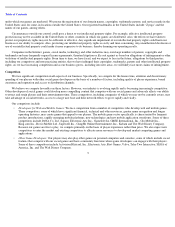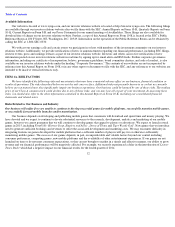Zynga 2014 Annual Report Download - page 22
Download and view the complete annual report
Please find page 22 of the 2014 Zynga annual report below. You can navigate through the pages in the report by either clicking on the pages listed below, or by using the keyword search tool below to find specific information within the annual report.
Table of Contents
support 64-bit development will increase the file size of our games, which could reduce the number of downloads of these games, particularly if
we are unable to keep the size of the games below 100 megabytes, which is the maximum file size that can currently be downloaded over any
carrier’s wireless network.
If we fail to maintain and enhance our capabilities for porting games to a broad array of mobile devices, particularly those running the
Android operating system, our revenues and financial results could suffer.
We derive a significant portion of our revenues from the sale of virtual goods within our games for smartphones and tablets that run
Apple’s iOS or Google’s Android operating system. Unlike the Apple ecosystem in which Apple controls both the device (iPhone, iPod Touch
and iPad) and the storefront (Apple’s App Store), the Android ecosystem is highly fragmented since a large number of OEMs manufacture and
sell Android-based devices that run a variety of versions of the Android operating system, and there are many Android-based storefronts in
addition to the Google Play Store. For us to sell our games to the widest possible audience of Android users, we must port our games to a
significant portion of the more than 1,000 Android-based devices that are commercially available, many of which have different technical
requirements. Since the number of Android-based smartphones and tablets shipped worldwide is growing significantly, it is important that we
maintain and enhance our porting capabilities, which could require us to invest considerable resources in this area. These additional costs could
harm our business, operating results and financial condition. In addition, we must continue to increase the efficiency of our porting processes or
it may take us longer to port games to an equivalent number of devices, which would negatively impact our margins. If we fail to maintain or
enhance our porting capabilities, our revenues and financial results could suffer.
We operate in a new and rapidly changing industry.
The social game industry, through which we derive substantially all of our revenue, is a new and rapidly evolving industry. The growth of
the social game industry and the level of demand and market acceptance of our games are subject to a high degree of uncertainty. Our future
operating results will depend on numerous factors affecting the social game industry, many of which are beyond our control, including:
19
•
our ability to extend our brand and games to mobile platforms and the timing and success of such mobile game launches;
•
continued worldwide growth in the adoption and use of Facebook and other social networks on which our platform relies;
•
our ability to maintain the popularity of our games on Facebook; iOS, Android and other platforms;
•
the transition of our players from the web to mobile devices, and our ability to effectively monetize games on mobile devices and
across multiple platforms and devices;
•
our ability to maintain technological solutions and employee expertise to rapidly respond to continuous changes in mobile platforms
and mobile devices;
•
our ability to maintain technological solutions and employee expertise to rapidly respond to changes in consumer demand for games
on new gaming platforms;
•
changes in consumer demographics and public tastes and preferences;
•
the availability and popularity of other forms of entertainment;
•
the worldwide growth of mobile devices, broadband Internet and personal computer users, and the rate of any such growth; and
•
general economic conditions, particularly economic conditions adversely affecting discretionary consumer spending.
























